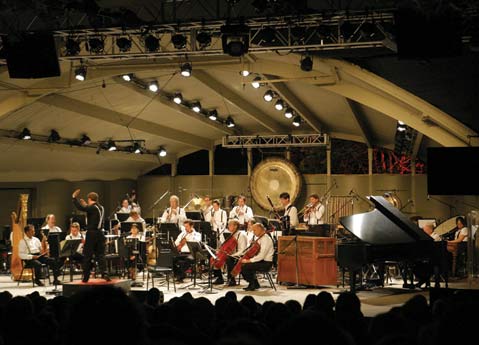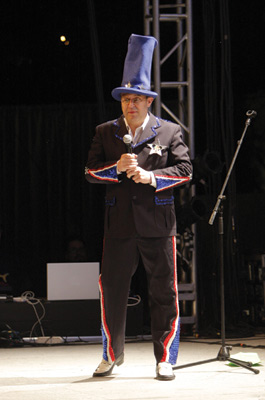Ojai Music Festival 2010
Music by Zappa, Messiaen, and Benjamin Performed at Ojai 2010

Under the direction of 2010 Music Director George Benjamin, the Ojai Music Festival swelled to bursting with gorgeous music, talented performers, challenging ideas, and eager listeners. In this 64th edition—the last in the original configuration of Libbey Bowl, which is to be rebuilt in time for next year’s festival—the programming ranged from the modern sacred music of Olivier Messiaen to the postmodernism of the often profane Frank Zappa. Along the way patrons were treated to early morning, afternoon, and late evening ragas, and an unforgettable night of contemporary opera. The overall impact was of an international institution at the height of its powers, and the Ojai Festival’s Artistic Director Thomas Morris and his staff deserve the highest praise for setting this event on such a righteously successful path.

Friday night’s program was divided between the music of Zappa and that of his great idol and compositional mentor, Edgard Varèse. Zappa’s classical compositions support his claim that all of his music belonged to just one genre—the Zappaesque. Ensemble Modern, some 31 players strong, brought out the joyful nature of this complex, rhythmically demanding music, letting Zappa’s ideas sing through a myriad of instruments including harp, glockenspiel, brass, strings, winds, and more. Conductor Brad Lubman wore black jeans and a black shirt with white suspenders, providing an inverse image to the orchestra, who were all attired in white shirts and dark suspenders. At least they were until “Welcome to the United States,” an outrageous Zappa spoken-word performance piece based on the form that a non-citizen of the U. S. must fill out when entering the country. Pianist Hermann Kretzschmar donned a spangled blue top hat and red, white, and blue trousers for his role as the reader in this counterpoint for bureaucratic inquiry and orchestra. After Kretzcshmar read the question “Are you engaged in any terrorist activities?” for instance, the orchestra flew into a manic 15 seconds or so of “Louie, Louie.” Of the two pieces by Varèse, the Octandre was the more successful, but, as became clear during the many encores (which included “Peaches en Regalia”), it was Zappa’s night.
On Saturday at 11 a.m., the pianist Eric Huebner gave an outstanding performance of Messiaen’s titanic Vingt Regards sur l’Enfant-Jésus. This modern masterpiece continues to grow in interest and grandeur as more pianists rise to its considerable challenges. The compositional achievement—more than two hours of solo piano music without repetition or cliché—is without peer in 20th century music, and that is saying quite a lot.
Saturday evening saw George Benjamin take the podium, first to conduct Igor Stravinsky’s Histoire du Soldat and then the Ensemble Modern plus singers Anu Komsi and Hilary Summers in his own short opera, Into the Little Hill. The Stravinsky was marvelous, with outstanding performances by Rumi Ogawa on percussion and Rafal Zambrzycki-Payne on violin. Yet even the high standard set by Stravinsky’s music was perhaps surpassed by Benjamin’s breathtaking opera version of “The Pied Piper” story, which is one of the most intriguing operas of the last several decades.



